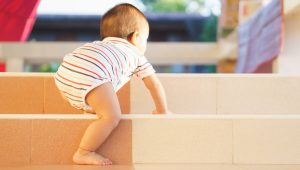 Fall Prevention for Children
Fall Prevention for Children
Young children are at a high risk for fall related injuries. In Virginia, falls are a leading cause of injury related hospitalizations for children under age 4.
- Never leave babies alone on any furniture, including beds, tables, sofas, or cribs and changing tables (with the guardrails down)–even if they have never rolled over before. Instead, put babies on the floor or in a crib with secured guardrails.
- More children are injured with baby walkers than with any other nursery product. Baby walkers can allow children to access stairways and areas of the home that may result in a fall.
- Install gates at top and bottom of stairs until children can climb up and down safely.
- Move chairs, cribs, beds, and other furniture away from windows. Children can quickly climb to window ledges or sills, and fall. Children can fall from windows opened as
few as five inches. - Safely secure windows with window guards or window stops to keep children from falling out of windows. Window screens are not designed to prevent falls. If you need to open windows, open them from the top –not the bottom.
- As babies get older and learn to sit and pull up to a standing position, lower the mattress in the crib. You should stop using the crib as soon as the top rails are less than 3/4 of the child’s height.
- Modify slippery surfaces and remove hazards whenever possible.
- Secure area rugs and throw rugs by using a nonskid backing.
- Select play equipment that is safe for young children such as equipment that keeps children low to the ground.
Download the Fall Prevention for Children tip card
Fire and Fall Prevention for Older Adults
Each year, many older adults die or experience permanent disability after a home fire or fall. Adults, at age 65, are twice as likely to be killed or injured by falls or fires, compared to the population at large.
- Prevent Fires:
- Install at least one smoke alarm on every level of your home and test them monthly.
- Keep yourself, and anything at least three feet from space heaters, portable heaters, and wood stoves. Turn off and unplug heaters when you leave your home or go
to bed. - Use large, deep ashtrays. Wet cigarette butts and ashes before emptying ashtrays. Never smoke when drowsy, lying down, or in bed.
- Wear tight-fitting or rolled-up sleeves when cooking. Use oven mitts to handle hot pans and never leave cooking unattended.
- “STOP, DROP, and ROLL,” if your clothes catch on fire.
- Immerse burns in cool water for 10-15 minutes. If burn is severe, get medical attention. Never put butter or grease on a burn.
- Know two ways out of each room, and plan and practice your fire escape. In a fire, get out and stay out. Call 911 after you’ve escaped from your home.
- Prevent Falls:
- Exercise regularly to build strength and improve balance and coordination.
- Keep stairs and walkways clear of tripping hazards.
- See an eye specialist once a year.
- Improve the lighting in your home. Turn on the lights before using the stairs and install a night-light along the path between the bedroom and bathroom.
- Use non-slip mats in the tub or shower.
- Use only throw rugs with rubber, nonskid backing.
- Install handrails along both sides of the stairs.
- Wear sturdy, well-fitted, low-heeled shoes with non-slip soles.
- Have a pharmacist review all your medications.
Download the Fire and Fall Prevention for Older Adult tip card
Last Updated: November 7, 2019

